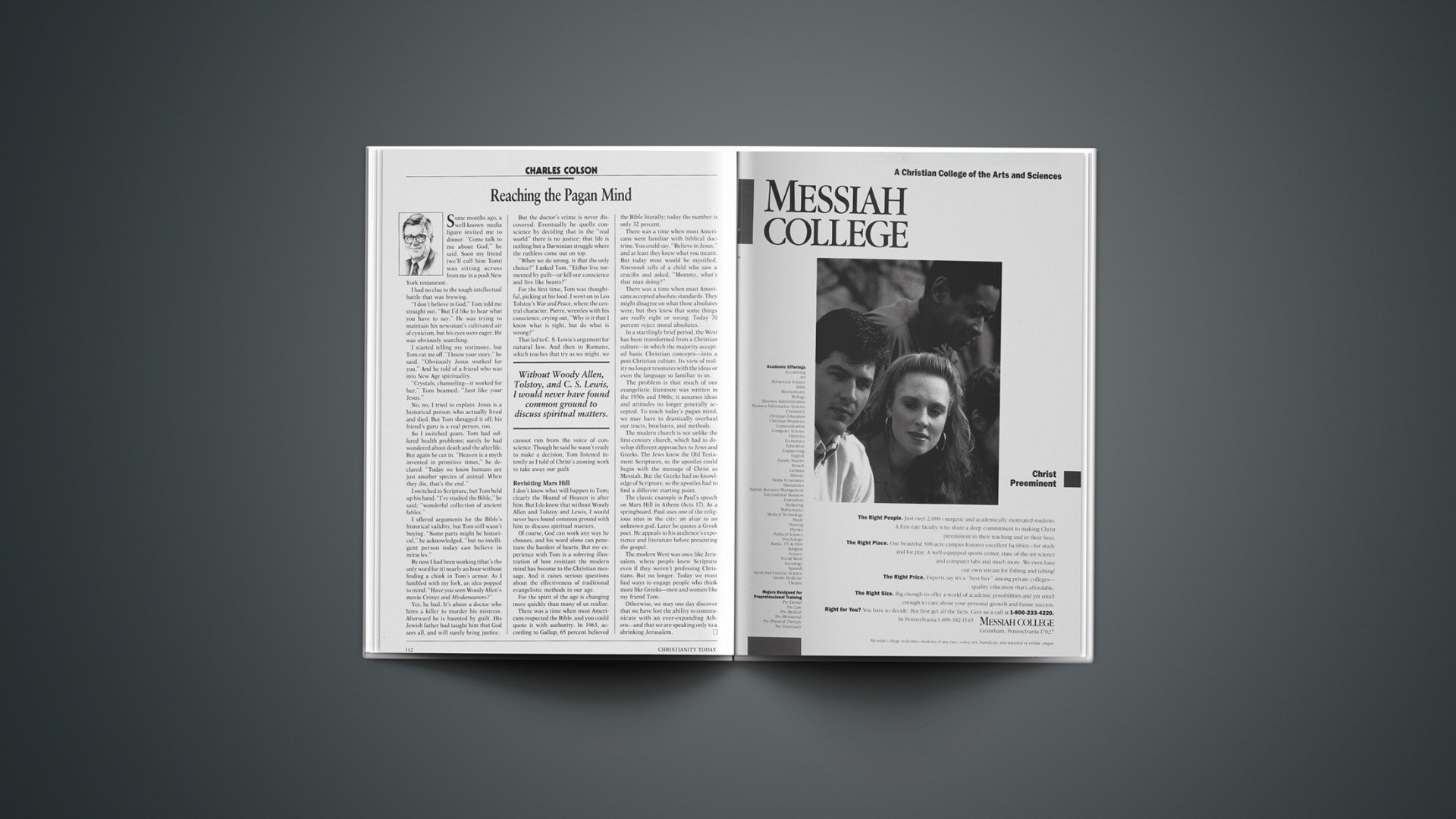Some months ago, a well-known media figure invited me to dinner. “Come talk to me about God,” he said. Soon my friend (we’ll call him Tom) was sitting across from me in a posh New York restaurant.
I had no clue to the tough intellectual battle that was brewing.
“I don’t believe in God,” Tom told me straight out. “But I’d like to hear what you have to say.” He was trying to maintain his newsman’s cultivated air of cynicism, but his eyes were eager. He was obviously searching.
I started telling my testimony, but Tom cut me off. “I know your story,” he said. “Obviously Jesus worked for you.” And he told of a friend who was into New Age spirituality.
“Crystals, channeling—it worked for her,” Tom beamed. “Just like your Jesus.”
No, no, I tried to explain. Jesus is a historical person who actually lived and died. But Tom shrugged it off; his friend’s guru is a real person, too.
So I switched gears. Tom had suffered health problems; surely he had wondered about death and the afterlife. But again he cut in. “Heaven is a myth invented in primitive times,” he declared. “Today we know humans are just another species of animal. When they die, that’s the end.”
I switched to Scripture, but Tom held up his hand. “I’ve studied the Bible,” he said; “wonderful collection of ancient fables.”
I offered arguments for the Bible’s historical validity, but Tom still wasn’t buying. “Some parts might be historical,” he acknowledged, “but no intelligent person today can believe in miracles.”
By now I had been working (that’s the only word for it) nearly an hour without finding a chink in Tom’s armor. As I fumbled with my fork, an idea popped to mind. “Have you seen Woody Allen’s movie Crimes and Misdemeanors?”
Yes, he had. It’s about a doctor who hires a killer to murder his mistress. Afterward he is haunted by guilt. His Jewish father had taught him that God sees all, and will surely bring justice.
But the doctor’s crime is never discovered. Eventually he quells conscience by deciding that in the “real world” there is no justice; that life is nothing but a Darwinian struggle where the ruthless come out on top.
“When we do wrong, is that the only choice?” I asked Tom. “Either live tormented by guilt—or kill our conscience and live like beasts?”
For the first time, Tom was thoughtful, picking at his food. I went on to Leo Tolstoy’s War and Peace, where the central character, Pierre, wrestles with his conscience, crying out, “Why is it that I know what is right, but do what is wrong?”
That led to C. S. Lewis’s argument for natural law. And then to Romans, which teaches that try as we might, we cannot run from the voice of conscience. Though he said he wasn’t ready to make a decision, Tom listened intently as I told of Christ’s atoning work to take away our guilt.
Revisiting Mars Hill
I don’t know what will happen to Tom; clearly the Hound of Heaven is after him. But I do know that without Woody Allen and Tolstoy and Lewis, I would never have found common ground with him to discuss spiritual matters.
Of course, God can work any way he chooses, and his word alone can penetrate the hardest of hearts. But my experience with Tom is a sobering illustration of how resistant the modern mind has become to the Christian message. And it raises serious questions about the effectiveness of traditional evangelistic methods in our age.
For the spirit of the age is changing more quickly than many of us realize.
There was a time when most Americans respected the Bible, and you could quote it with authority. In 1963, according to Gallup, 65 percent believed the Bible literally; today the number is only 32 percent.
There was a time when most Americans were familiar with biblical doctrine. You could say, “Believe in Jesus,” and at least they knew what you meant. But today most would be mystified. Newsweek tells of a child who saw a crucifix and asked, “Mommy, what’s that man doing?”
There was a time when most Americans accepted absolute standards. They might disagree on what those absolutes were, but they knew that some things are really right or wrong. Today 70 percent reject moral absolutes.
In a startlingly brief period, the West has been transformed from a Christian culture—in which the majority accepted basic Christian concepts—into a post-Christian culture. Its view of reality no longer resonates with the ideas or even the language so familiar to us.
The problem is that much of our evangelistic literature was written in the 1950s and 1960s; it assumes ideas and attitudes no longer generally accepted. To reach today’s pagan mind, we may have to drastically overhaul our tracts, brochures, and methods.
The modern church is not unlike the first-century church, which had to develop different approaches to Jews and Greeks. The Jews knew the Old Testament Scriptures, so the apostles could begin with the message of Christ as Messiah. But the Greeks had no knowledge of Scripture, so the apostles had to find a different starting point.
The classic example is Paul’s speech on Mars Hill in Athens (Acts 17). As a springboard, Paul uses one of the religious sites in the city: an altar to an unknown god. Later he quotes a Greek poet. He appeals to his audience’s experience and literature before presenting the gospel.
The modern West was once like Jerusalem, where people knew Scripture even if they weren’t professing Christians. But no longer. Today we must find ways to engage people who think more like Greeks—men and women like my friend Tom.
Otherwise, we may one day discover that we have lost the ability to communicate with an ever-expanding Athens—and that we are speaking only to a shrinking Jerusalem.










